礼物作文之不同国家送礼物习俗的英语作文
给外国朋友送中国特色的礼物英语作文
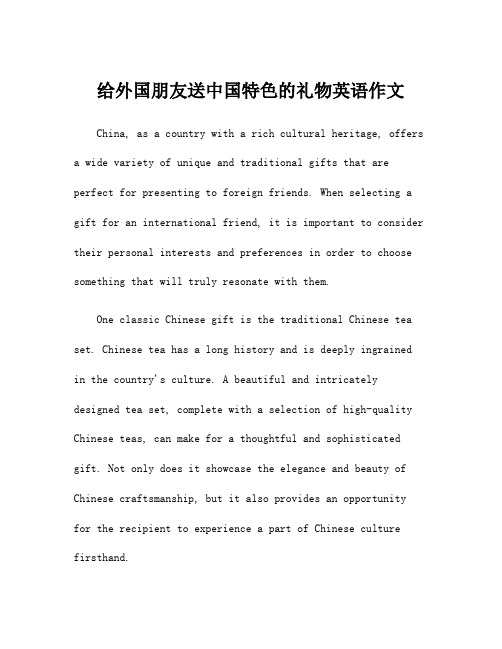
给外国朋友送中国特色的礼物英语作文China, as a country with a rich cultural heritage, offers a wide variety of unique and traditional gifts that are perfect for presenting to foreign friends. When selecting a gift for an international friend, it is important to consider their personal interests and preferences in order to choose something that will truly resonate with them.One classic Chinese gift is the traditional Chinese tea set. Chinese tea has a long history and is deeply ingrained in the country's culture. A beautiful and intricately designed tea set, complete with a selection of high-quality Chinese teas, can make for a thoughtful and sophisticated gift. Not only does it showcase the elegance and beauty of Chinese craftsmanship, but it also provides an opportunityfor the recipient to experience a part of Chinese culture firsthand.Another popular gift option is Chinese calligraphy art. This traditional art form holds significant cultural value in China and can make for a stunning and meaningful gift. Calligraphy sets, featuring brushes, ink, and paper, allow the recipient to try their hand at this ancient art form while appreciating the beauty of Chinese characters and the skill required to master them.For those with a sweet tooth, Chinese traditional snacks such as mooncakes, a popular treat during the Mid-Autumn Festival, can be a delightful and delicious gift. These intricately designed pastries come in a variety of flavors and fillings, making them a unique and memorable present for a foreign friend.In addition to these traditional gifts, various Chinese handicrafts and artworks, such as silk embroideries, porcelain vases, or intricately carved jade items, can alsoserve as exceptional and culturally significant presents for international friends.Ultimately, when selecting a gift for a foreign friend, it is important to choose something that not only captures the essence of Chinese culture but also resonates with the individual recipient. By presenting them with a thoughtful and unique gift that reflects the beauty and complexity of Chinese traditions, one can undoubtedly strengthen the bond between friends from different cultures and create lasting memories of their time spent together.。
给人送礼物英语作文带翻译
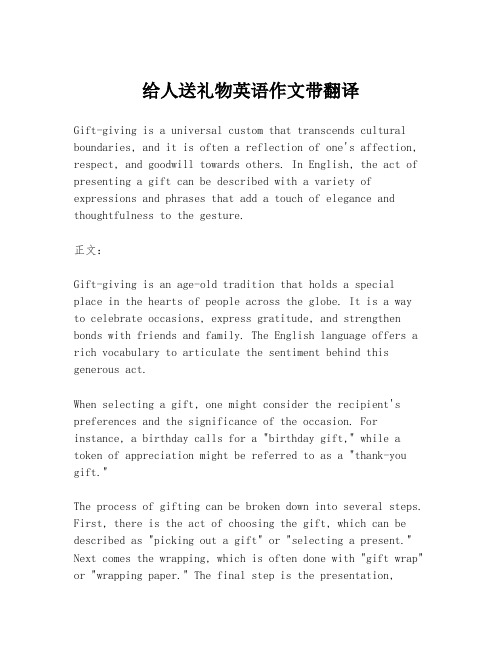
给人送礼物英语作文带翻译Gift-giving is a universal custom that transcends cultural boundaries, and it is often a reflection of one's affection, respect, and goodwill towards others. In English, the act of presenting a gift can be described with a variety of expressions and phrases that add a touch of elegance and thoughtfulness to the gesture.正文:Gift-giving is an age-old tradition that holds a special place in the hearts of people across the globe. It is a way to celebrate occasions, express gratitude, and strengthen bonds with friends and family. The English language offers a rich vocabulary to articulate the sentiment behind this generous act.When selecting a gift, one might consider the recipient's preferences and the significance of the occasion. For instance, a birthday calls for a "birthday gift," while a token of appreciation might be referred to as a "thank-you gift."The process of gifting can be broken down into several steps. First, there is the act of choosing the gift, which can be described as "picking out a gift" or "selecting a present." Next comes the wrapping, which is often done with "gift wrap" or "wrapping paper." The final step is the presentation,where one might "hand over the gift" or "present the gift" to the recipient.During the presentation, it is common to use phrases such as "I hope you like it," "This is for you," or "I got this thinking of you." These phrases convey warmth and the personal effort put into finding the perfect gift.In English, the etiquette of gift-giving also includes the act of receiving. When receiving a gift, it is polite to express gratitude with phrases like "Thank you, I really appreciate it," or "This is very kind of you."Gift-giving is not just about the material object; it is about the sentiment it carries. A well-chosen gift can speak volumes about the giver's understanding and care for the recipient. It is the thought that counts, and this sentiment is beautifully captured in the English saying, "It's the thought that counts."翻译:赠送礼物是一项跨越文化界限的普遍习俗,它通常是对他人感情、尊重和善意的一种反映。
中国三件有特色的礼物英语作文
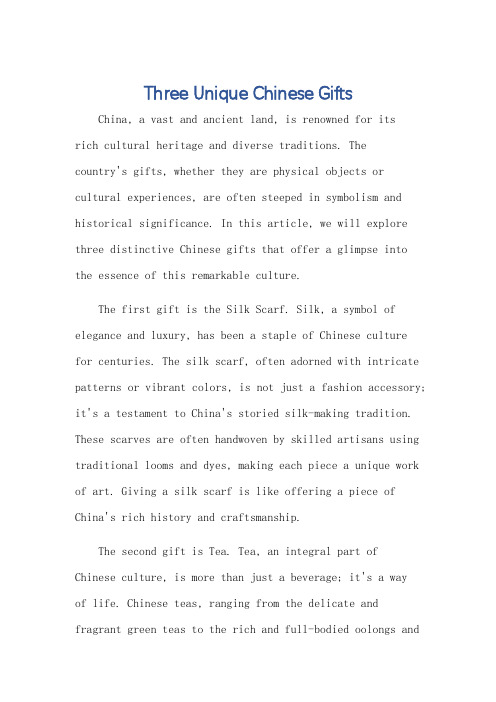
Three Unique Chinese GiftsChina, a vast and ancient land, is renowned for itsrich cultural heritage and diverse traditions. Thecountry's gifts, whether they are physical objects or cultural experiences, are often steeped in symbolism and historical significance. In this article, we will explore three distinctive Chinese gifts that offer a glimpse into the essence of this remarkable culture.The first gift is the Silk Scarf. Silk, a symbol of elegance and luxury, has been a staple of Chinese culturefor centuries. The silk scarf, often adorned with intricate patterns or vibrant colors, is not just a fashion accessory; it's a testament to China's storied silk-making tradition. These scarves are often handwoven by skilled artisans using traditional looms and dyes, making each piece a unique work of art. Giving a silk scarf is like offering a piece of China's rich history and craftsmanship.The second gift is Tea. Tea, an integral part of Chinese culture, is more than just a beverage; it's a wayof life. Chinese teas, ranging from the delicate andfragrant green teas to the rich and full-bodied oolongs andpu-erhs, offer a range of flavors and experiences. Giving tea is like inviting someone into your home and sharing a piece of your culture. It's a gesture of respect and hospitality, and it's a way of connecting with someone on a deeper level.The third gift is the Chinese Calligraphy Set. Calligraphy, the art of writing with a brush and ink, is a highly respected and revered art form in China. Acalligraphy set, which typically includes a brush, ink, paper, and a stone for grinding the ink, is a beautiful and meaningful gift. It represents the art of expression and creativity, as well as a connection to China's ancient literary traditions. Giving a calligraphy set is like offering someone the opportunity to explore and engage with China's rich literary heritage.These three gifts, the Silk Scarf, Tea, and the Chinese Calligraphy Set, are not just physical objects; they are cultural ambassadors that carry the essence of China with them. They offer a window into the rich history, traditions, and artistry of this remarkable country, and they areperfect gifts for anyone who wants to connect with and appreciate Chinese culture.**中国三件有特色的礼物**中国,这片广袤而古老的土地,以其丰富的文化遗产和多样的传统而著称。
介绍一些国家赠送礼物的风俗英语作文
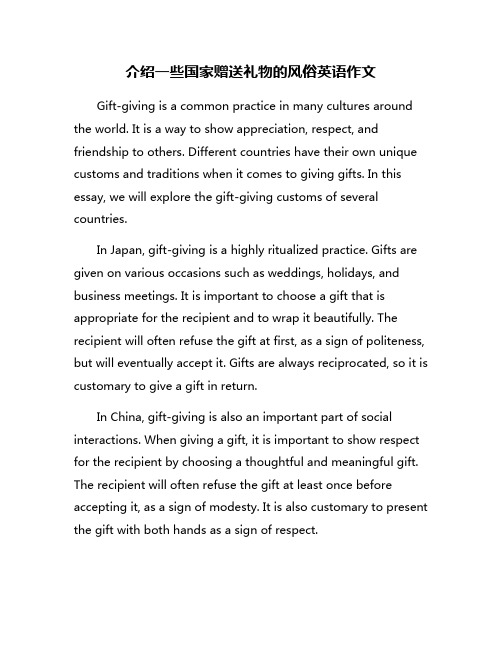
介绍一些国家赠送礼物的风俗英语作文Gift-giving is a common practice in many cultures around the world. It is a way to show appreciation, respect, and friendship to others. Different countries have their own unique customs and traditions when it comes to giving gifts. In this essay, we will explore the gift-giving customs of several countries.In Japan, gift-giving is a highly ritualized practice. Gifts are given on various occasions such as weddings, holidays, and business meetings. It is important to choose a gift that is appropriate for the recipient and to wrap it beautifully. The recipient will often refuse the gift at first, as a sign of politeness, but will eventually accept it. Gifts are always reciprocated, so it is customary to give a gift in return.In China, gift-giving is also an important part of social interactions. When giving a gift, it is important to show respect for the recipient by choosing a thoughtful and meaningful gift. The recipient will often refuse the gift at least once before accepting it, as a sign of modesty. It is also customary to present the gift with both hands as a sign of respect.In India, gift-giving is a way to show appreciation and build relationships. Gifts are often given on special occasions such as weddings, festivals, and birthdays. It is important to choose a gift that is appropriate for the occasion and to present it with both hands. Gifts are often given in multiples of seven or nine, which are considered lucky numbers in Indian culture.In the United States, gift-giving is often associated with holidays such as Christmas, birthdays, and anniversaries. Gifts are given to show love and appreciation for friends and family. It is customary to choose a gift that reflects the recipient's interests and preferences. Gift cards are also a popular gift choice, as they allow the recipient to choose their own present.In conclusion, gift-giving is a universal practice that is important in building relationships and showing appreciation. Each country has its own customs and traditions when it comes to giving gifts, but the sentiment behind the gesture is the same - to show love, respect, and friendship to others. Whether it is a beautifully wrapped gift in Japan, a carefully chosen gift in China, a lucky number gift in India, or a thoughtful present in the United States, the act of giving a gift is a meaningful and heartfelt gesture.。
英语作文,中英两国送礼物的区别
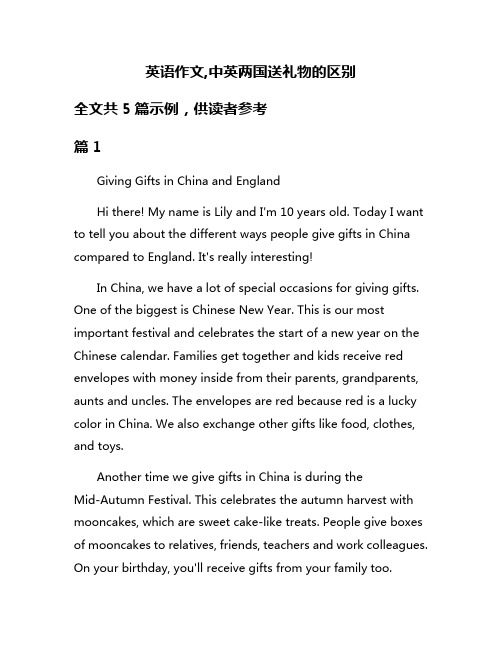
英语作文,中英两国送礼物的区别全文共5篇示例,供读者参考篇1Giving Gifts in China and EnglandHi there! My name is Lily and I'm 10 years old. Today I want to tell you about the different ways people give gifts in China compared to England. It's really interesting!In China, we have a lot of special occasions for giving gifts. One of the biggest is Chinese New Year. This is our most important festival and celebrates the start of a new year on the Chinese calendar. Families get together and kids receive red envelopes with money inside from their parents, grandparents, aunts and uncles. The envelopes are red because red is a lucky color in China. We also exchange other gifts like food, clothes, and toys.Another time we give gifts in China is during theMid-Autumn Festival. This celebrates the autumn harvest with mooncakes, which are sweet cake-like treats. People give boxes of mooncakes to relatives, friends, teachers and work colleagues. On your birthday, you'll receive gifts from your family too.There are some special traditions around gift-giving in China. For example, you should never give a clock as a gift because the words for "giving a clock" sound similar to the words for "attending a funeral". That would be very unlucky! Gifts are often wrapped in red or gold paper as these are lucky colors. The number 4 is unlucky since it sounds similar to the word for "death", so gifts with 4 items are avoided.When receiving a gift, you shouldn't open it immediately in front of the giver. That's considered impolite. You say "thank you" first and open it later when they've left. It's also polite to refuse a gift one or two times before accepting to show humility.Gift-giving customs are a bit different in England. There aren't as many traditions around colors, numbers, and how to accept gifts. The big gift-giving times are Christmas, when families exchange presents on December 25th, and birthdays.For Christmas, kids hang up stockings and wake up to small gifts like chocolate coins, satsumas, and little toys inside them. Under the Christmas tree there are bigger presents like books, games, clothes and electronics. Christmas crackers are also opened which have tiny gifts, jokes and paper crowns inside.On birthdays, the person having a birthday gets to open gifts from friends and family. A lot of people give money, gift cards, books or toys as birthday presents.There are also traditions like Christmas crackers and birthday cakes with candles that you have to blow out and make a wish. But not as many very specific customs like in China.Another difference is that in England, it's common to just say "thank you" when receiving a gift and start opening it right away. The giver usually watches you open it. There's no culture of refusing a few times before accepting like we have in China.So those are some of the fascinating differences I've noticed between gift-giving in China and England. Of course every family is different, but those are some of the typical traditions. I hope you found it interesting to learn about! Let me know if you have any other questions.篇2Gift-Giving in China and the UKGiving gifts is something people do all around the world, but the way we give gifts is different in different countries and cultures. I'm going to tell you about how gift-giving is done inChina, where my family is from, and in the UK, where I live now. Get ready, because it's really interesting!In China, we give gifts for lots of different reasons and holidays. One of the biggest times for giving gifts is Chinese New Year. At Chinese New Year, kids like me get red envelopes filled with money from our parents, grandparents, aunts and uncles. The red color is supposed to bring good luck. We also give gifts to our friends and other relatives during this holiday. Popular gifts are food items like candy, dried fruits, nuts, and fancy snacks.Another important gift-giving time in China is for birthdays. When someone has a birthday, their friends and family will give them gifts like clothes, books, electronics, or whatever else they might like based on their age and interests. You have to be careful with the colors you pick for wrapping paper though - some colors like white and black aren't lucky colors in China.One more time when Chinese people give gifts is at Spring Festival, which happens in January or February each year. People might give fruits like oranges because they symbolize prosperity and good fortune. We also give money in red envelopes to kids.No matter what the occasion is, we usually don't open gifts in front of the person who gave them in China. It's consideredpolite to open them in private later. That way if we don't like the gift, our face won't give it away! Price and money are also important when giving gifts in China - we try to spend a bit more on gifts for elders, bosses, or people of higher status to show our respect.Now let me tell you about how gift-giving works in the UK! One big difference is that gifts are mostly just given for birthdays and Christmas here. Sometimes people might get little gift for other reasons like passing an exam or having a baby, but those bigger celebrations are the main gift-giving times.For birthdays in the UK, the most common gifts are toys for little kids, clothes, books, music, video games, or money for older kids and adults. Everyone usually opens their gifts right away in front of the people who gave them. That would be considered rude to do in private in the UK. When I got gifts for my birthday here for the first time, I was surprised that I had to open them in front of everyone!The biggest gift-giving time in the UK is Christmas. Days or even weeks before Christmas, kids write letters to Father Christmas (the UK version of Santa Claus) to tell him what toys and presents they would like. Then on Christmas morning, we wake up to piles of gifts under the Christmas tree from FatherChristmas as well as our family and friends! Popular gifts are toys, games, books, clothes, electronics like phones and tablets. We spend the whole morning opening gifts together as a family.Another difference is that there aren't as many strict rules around colors or numbers with gift wrapping and giving gifts in the UK compared to some of the traditions in China. And while money is sometimes given as a gift, it's not as common or as symbolic as giving money during holidays like Chinese New Year.So those are some of the main ways that gift-giving traditions are different between China and the UK! In both cultures, gifts are a way to celebrate special days, show people you care about them, and share in happiness together. But the specific holidays, gift choices, wrapping, and etiquette can be quite different. Having grown up between these two cultures,I've experienced the best of both worlds when it comes to gifts! No matter what, I always feel very lucky.篇3Giving Gifts in China and the UKHi there! My name is Emma and I'm going to tell you all about how people give gifts in China compared to the UK. It's really interesting to see the different traditions!In China, giving gifts is a huge part of the culture. There are lots of special occasions when people exchange gifts with family, friends, teachers, and even work colleagues. The biggest one is definitely Chinese New Year. A few weeks before New Year, shops are packed with people buying gifts like food baskets, toys, clothes, and other little things. Kids are given red envelopes with money inside from their parents, grandparents, aunties and uncles. how much money depends on how old you are and how close you are to that relative.Another big time for gift giving in China is duringMid-Autumn Festival. Mooncakes in beautiful boxes are a really popular gift to give. They come in all different flavors like lotus seed paste, red bean, and even ice cream filling! Other typical gifts are fruit baskets, tea, wine, and candles.At weddings, the bride's family gives the groom's family gift baskets filled with fancy fruits, cookies, candy, and sometimes jewelry. The groom's side also brings gifts when they come to pick up the bride. Older people give red envelopes with money to the newly married couple to wish them a prosperous life together.In schools, kids give small stationery gifts to teachers on Teacher's Day, usually just a simple notepad or pen. Forclassmates' birthdays, typical gifts are snacks, stationery, or little toys.There are a few special things about giving gifts in China:Wrapping is very important and gifts are beautifully wrapped, often in red paper.People don't open gifts in front of the giver as it's seen as impolite.You can't give clocks, umbrellas, or certain numbers of gifts as they have unlucky meanings.It's usual to refuse a gift a few times before finally accepting to seem polite.Now let me tell you about the UK! Some things are similar to China, like giving gifts for Christmas, weddings, and birthdays. But there are some differences too.For Christmas, Santa brings kids toys and games, plus we hang up stockings to be filled with small gifts like chocolate coins, satsumas, and little toys. Gifts for adults are often ornaments, candles, chocolates, wines, and books. It's a really big deal!Kids don't usually give gifts to teachers, except maybe a Christmas ornament or box of chocolates at the end of the school year. For birthdays, typical kids' gifts are toys, books, games, and clothes. Adults give things like flowers, wine, chocolates, or gift cards.At weddings, guests bring gifts from the couple's registry like kitchen things, bedroom sets, or just money in an envelope. The bride's family doesn't give big baskets to the groom's family.In general, gifts are usually just wrapped in typical gift wrap paper and bows in the UK. There aren't too many traditions about colors or avoiding certain items. And people do open gifts in front of the giver!So those are some of the key differences in gift giving between China and the UK. Both countries love giving gifts, but the traditions and typical gifts can be quite different.Present-giving is a way to show love, appreciation and celebration no matter where you're from. I think it's really fun learning about how people in different cultures exchange gifts!篇4Giving Gifts in China and EnglandHi there! My name is Lucy and I'm 10 years old. Today I want to tell you about the different ways people give gifts in China and England. It's really interesting to see how these two countries have some similarities but also lots of differences when it comes to gift-giving traditions.In China, we place a huge importance on giving gifts, especially during festivals and special occasions like Chinese New Year, Mid-Autumn Festival, weddings, and birthdays.Gift-giving is a way to show respect, build relationships, and wish people happiness and good luck. Red envelopes with money inside are one of the most common gifts, especially for children. We believe that receiving a red envelope brings good fortune.When giving gifts in China, we usually don't open them right away in front of the gift-giver. That's considered impolite. We thank the person and put the gift aside to open later in private. The reason is that if we don't like the gift, we don't want to hurt the giver's feelings by showing our disappointment. It's all about being humble and not making the other person lose face.The types of gifts we give in China often have special meanings too. For example, giving a clock is bad luck because the words for "clock" and "funeral" sound similar. Umbrellas are no-nos too since the word umbrella sounds like the word for"break up." Shoes shouldn't be gifted either as they symbolize the person walking away from you. Nice gifts include things like tea sets, fans, healthy snacks, and fruit like oranges which represent prosperity.In England, gifts are given for similar celebrations like Christmas, birthdays, weddings, and new babies being born. However, there seems to be less cultural tradition and symbolism around the gifts themselves. People often give more practical gifts like clothes, books, toys, chocolates, wine, and beauty products.A big difference is that in England, people usually open gifts right away in front of the gift giver. They make sure to show their appreciation for the gift, even if they don't love it. It's not considered rude at all. In fact, it's expected! If someone doesn't open a gift right away, the gift giver might feel awkward or think the recipient doesn't like their gift.There are some fun similarities though! Both countries use colorful wrapping paper and ribbons to make gifts look beautiful before giving them. We all enjoy the excitement of shaking wrapped boxes to guess what's inside. And of course, giving and receiving gifts makes everyone feel warm and happy no matter where you live.While there are definitely differences in gift-giving between China and England, I think the reasons behind it are the same - we all want to make our loved ones feel special and cared for. Even if the traditions are different, the thought and love behind gifts is universal. Wouldn't it be nice if people from all countries could learn to embrace each other's customs and cultures around gift-giving? That would make giving gifts even more meaningful.Anyway, those are my thoughts on how gift-giving works in China compared to England. Of course, I'm just a 10-year-old so there's probably a lot more to learn! I'd love to hear about any other interesting gift customs from around the world. Gift-giving traditions are a window into different cultures and how people celebrate important moments in life. Pretty cool, right? Let me know what you think!篇5Giving Gifts in China and the UKHi there! My name is Li Ming and I'm going to tell you about how people give gifts in China compared to the United Kingdom. Giving gifts is really important in both countries, but there are some big differences that I've noticed.In China, we take gift-giving super seriously! It's a way to show respect, build relationships, and keep traditions alive. One of the biggest events for gift-giving is Chinese New Year. Everyone gets brand new clothes, shoes, and other little red things like pouches or wallets. The red colour represents good luck. Kids also get money in little red envelopes called "hongbao" from their parents, grandparents, aunts and uncles. The bills have to be brand new and crisp. Getting wrinkly money is actually considered rude!Another time we give a lot of gifts is at weddings. The guests are expected to give money to the newly married couple in beautiful red envelopes. The money is supposed to wish them fortune and prosperity. Sometimes the envelopes have nice designs like double happiness symbols or dragons and phoenixes. My uncle got married last year and I saved up my pocket money to put in one of the red envelopes. I was really proud!When I was younger, my grandma used to tell me and my cousins traditional stories about gift-giving. One story was about an emperor who liked a painting of a river so much that he decided to "gift" the river itself to the artist! Wild, right? This kindof grand, over-the-top gift from the ancient times shows how crucial gift-giving was seen in Chinese culture.In the UK, gift-giving seems a bit more casual and relaxed from what I've seen. The biggest times for exchanging gifts are Christmas and birthdays. For Christmas, kids get presents from Santa Claus (known as Father Christmas over there) if they've been good that year. Adults usually buy gifts for their close family members, friends, and partners.One interesting tradition is pulling holiday crackers with your family or friends before the Christmas meal. Inside the crackers, there are little plastic toys, paper crowns to wear, and corny jokes to read out loud. I think it's a fun way to get into the festive spirit! People also hang up stockings by the fireplace and wake up to find them filled with chocolate coins, satsumas, and other small gifts from Santa.For birthdays, British people don't seem as particular about when you open the gifts. In my family, we always wait until midnight on the birthday before opening anything. But I've heard from my British friends that people often open their cards and presents first thing in the morning or even right after school if their birthday was during the day. They also have this tradition of pinning the money from gift cards onto a bigger card alongwith birthday messages from everyone. I'd love to get my own money card like that one day!When buying gifts for someone in the UK, I don't think there are as many strict rules compared to Chinese culture. But they still put a lot of thought into finding the perfect, personal gift for their loved ones based on their interests and hobbies. My British pen pal Lucy told me that she spends ages browsing online stores and making wish lists well before someone's birthday or Christmas.One fun difference is that British people love giving novelty and joke gifts too, like mugs with rude words or socks with pizza prints. Pretty much everyone in their family - kids, parents, grandparents - gets in on the silly present game! In China, we tend to go for more practical, elegant, or luxurious gifts. Things like nice silk accessories, jewellery, or delicious food hampers. I don't think my grandma would ever give me a pair of hot dog socks!Overall, while gift-giving traditions are deeply meaningful in both China and the UK, I find the Chinese way a bit more formal and symbolic. Every gift, colour, and amount has significance in Chinese culture. But British gifting is more lighthearted andpersonal. Either way, exchanging gifts is an awesome way to make people smile in any country!Well, that's all I have to say for now. Giving and receiving presents is just so much fun, no matter where you're from! I can't wait for my next birthday or Chinese New Year to get some more awesome gifts. Speaking of which, I think my dad just got home from work...gotta run and see if he brought me back a little something!。
中国送礼物传统英语作文
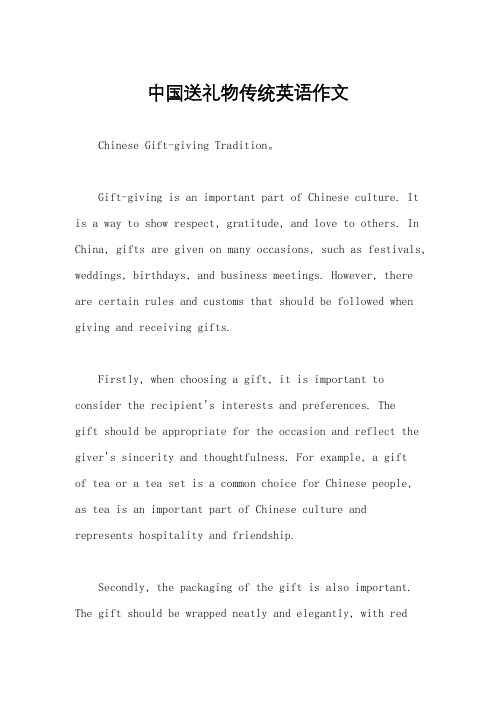
中国送礼物传统英语作文Chinese Gift-giving Tradition。
Gift-giving is an important part of Chinese culture. It is a way to show respect, gratitude, and love to others. In China, gifts are given on many occasions, such as festivals, weddings, birthdays, and business meetings. However, there are certain rules and customs that should be followed when giving and receiving gifts.Firstly, when choosing a gift, it is important to consider the recipient's interests and preferences. Thegift should be appropriate for the occasion and reflect the giver's sincerity and thoughtfulness. For example, a giftof tea or a tea set is a common choice for Chinese people, as tea is an important part of Chinese culture and represents hospitality and friendship.Secondly, the packaging of the gift is also important. The gift should be wrapped neatly and elegantly, with redand gold being the most popular colors, as they symbolize good luck and fortune. In addition, it is customary to give gifts in pairs, as this represents harmony and balance.Thirdly, when giving a gift, it is polite to present it with both hands, and to express one's good wishes and gratitude. The recipient should also receive the gift with both hands, and express their thanks and appreciation.Finally, it is important to note that there are certain gifts that should be avoided. For example, clocks, handkerchiefs, and sharp objects are considered unlucky gifts, as they symbolize death or separation. In addition, gifts that are too expensive or extravagant may be seen as inappropriate or even offensive.In conclusion, gift-giving is an important aspect of Chinese culture, and it is important to follow the customs and rules when giving and receiving gifts. By choosing an appropriate gift, wrapping it beautifully, presenting it with respect, and expressing one's good wishes, gift-givingcan be a meaningful and enjoyable experience for both the giver and the recipient.。
中西方送礼物的差异英语作文
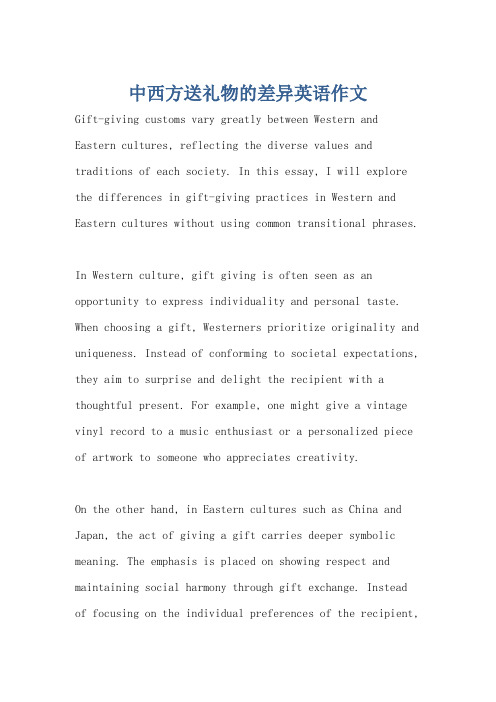
中西方送礼物的差异英语作文Gift-giving customs vary greatly between Western and Eastern cultures, reflecting the diverse values and traditions of each society. In this essay, I will explore the differences in gift-giving practices in Western and Eastern cultures without using common transitional phrases.In Western culture, gift giving is often seen as an opportunity to express individuality and personal taste. When choosing a gift, Westerners prioritize originality and uniqueness. Instead of conforming to societal expectations, they aim to surprise and delight the recipient with a thoughtful present. For example, one might give a vintage vinyl record to a music enthusiast or a personalized piece of artwork to someone who appreciates creativity.On the other hand, in Eastern cultures such as China and Japan, the act of giving a gift carries deeper symbolic meaning. The emphasis is placed on showing respect and maintaining social harmony through gift exchange. Instead of focusing on the individual preferences of the recipient,a more traditional approach is taken. Gifts are typically chosen based on their auspiciousness or symbolism rather than personal interests.For instance, in Chinese culture, red envelopes containing money are commonly given during special occasions such as weddings or Lunar New Year celebrations. The color red symbolizes good luck and prosperity. In contrast, gifts with sharp edges or clocks are avoided as they are associated with negative connotations like severance or time running out.Furthermore, reciprocity plays an essential role in Eastern gift-giving customs. When someone receives a gift from another person during certain occasions like birthdays or anniversaries, it is expected that they reciprocate the gesture by giving a similarly valued present on another occasion. This practice ensures that social obligations are met while maintaining balance within relationships.In contrast, Western societies value spontaneity and lack the same level of reciprocity when it comes to gift-giving.It is not uncommon for individuals to receive gifts during special events without feeling obliged to reciprocate immediately or at all. Rather than viewing gift-giving as a transaction, Westerners often cherish the sentiment and thought behind the gift.In summary, the differences in gift-giving traditions between Western and Eastern cultures are significant. While Western culture emphasizes personal taste and surprise, Eastern cultures prioritize symbolism, respect, and reciprocity. Understanding these cultural nuances can help individuals navigate the complexities of gift-giving practices around the world.Word count: 297。
中西方送礼文化差异英语作文
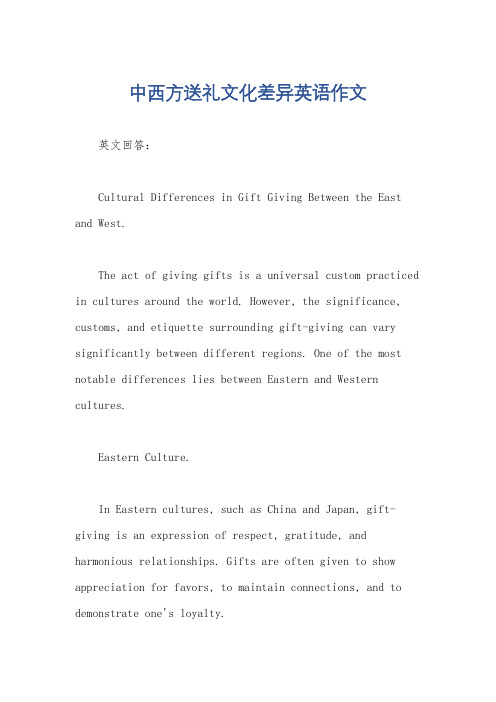
中西方送礼文化差异英语作文英文回答:Cultural Differences in Gift Giving Between the East and West.The act of giving gifts is a universal custom practiced in cultures around the world. However, the significance, customs, and etiquette surrounding gift-giving can vary significantly between different regions. One of the most notable differences lies between Eastern and Western cultures.Eastern Culture.In Eastern cultures, such as China and Japan, gift-giving is an expression of respect, gratitude, and harmonious relationships. Gifts are often given to show appreciation for favors, to maintain connections, and to demonstrate one's loyalty.Importance of face-saving: Preserving one's "face" is a crucial concept in Eastern cultures. Gifts are often chosen to reflect the recipient's status, taste, and preferences.Emphasis on reciprocity: Gift-giving is considered a two-way street. Recipients are expected to reciprocate with a gift of equal or greater value.Ritualized practices: The act of gift-giving is often accompanied by specific rituals, such as the use of both hands to present the gift and the exchange of polite phrases.Western Culture.In Western cultures, gift-giving is primarily seen as a gesture of friendship, affection, or celebration. Gifts are often given on special occasions, such as birthdays, holidays, or anniversaries.Focus on sentimentality: Gifts are often chosen based on their personal value or sentimentality to the recipient.Less emphasis on status: While status may still be considered to some extent, it is not as central to gift-giving as it is in Eastern cultures.Simpler rituals: Gift-giving rituals are generally less formalized and may include a simple exchange of gifts without an elaborate ceremony.Other Key Differences.Packaging: In Eastern cultures, the packaging of agift is as important as the gift itself. Gifts are often wrapped beautifully and may include decorative ornaments. In Western cultures, packaging is typically less elaborate.Cost: In Western cultures, gifts are often expected to be within a certain price range, while in Eastern cultures, the cost of a gift may be more flexible.Timing: In Eastern cultures, it is considered important to give a gift at the appropriate time and occasion. In Western cultures, the timing of a gift is less crucial.Conclusion.The cultural differences in gift-giving between Eastern and Western cultures are rooted in their respectivesocietal values and traditions. Understanding these differences can help ensure that gift-giving is a positive and meaningful experience for all parties involved.中文回答:东西方送礼文化差异。
- 1、下载文档前请自行甄别文档内容的完整性,平台不提供额外的编辑、内容补充、找答案等附加服务。
- 2、"仅部分预览"的文档,不可在线预览部分如存在完整性等问题,可反馈申请退款(可完整预览的文档不适用该条件!)。
- 3、如文档侵犯您的权益,请联系客服反馈,我们会尽快为您处理(人工客服工作时间:9:00-18:30)。
礼物作文之不同国家送礼物习俗的英语作文不同国家送礼物习俗的英语作文【篇一:风俗习惯(中西方差异)英语版】夏威夷的风俗习惯如果想要真正地了解夏威夷的风俗习惯,就必须了解夏威夷在白人文明进入之前的习俗,即夏威夷卡普制度时期的风俗习惯。
卡普制度是在1820年左右消亡的(参阅卡普制度)。
直到现在,很多传统的夏威夷人还是认为,枕头是不可以用脚踩、也不可以坐的。
男人出海打鱼,家里人不可以问他上哪里,也不可以在男人离家期间招待客人,下海的人不可以带随行香蕉,否则就会倒霉。
作者作为女人,又生活在夏威夷,真的是非常庆幸以上这些习俗随着基督教义的传播到了1820左右都已经没有了。
但尽管这样,历史的痕迹偶尔也会在后代中显现,本人也有所经历。
以下这些生活的习俗,在某些土著居民区偶尔还会碰到,如果你来夏威夷,入境问俗,说不定能派上用场。
带花夏威夷人送鲜花做成的花环表示欢或祝贺,他(她)会为你带在脖子上。
你接受了以后不要马上取下来,你也不能马上就摘下来转赠他人,除非你转赠的对象是你的家庭成员。
否则会被认为很不礼貌。
行为做贼的人手会痛而且会生癣,淫乱的男人下体会痛。
走路时脚无故地痛起来的人要小心,可能你走错路了。
丧葬中西文化在称谓上的差异较大。
西方称谓不拘礼节,多用名字相称,不仅兄弟姐妹间如此,即时对长辈和师长,也有直呼其名的,这与中国文化中长幼有序的称谓习惯完全不同;汉语中的“老”是对人的尊称,而英语中“old”却是“useless”(衰老、不中用)之意,十分忌用;再者,汉语中常常将职业作为称谓,如称张局长,李主人,王老师等,英语中却只说:mr.zhang,mr.li,miss wang等。
中国人见面打招呼时,常常问对方“吃了吗?”“去哪里?”“忙什么呢?”等,而西方人听到类似问候,会感到别扭、不快甚至恼怒。
如果一个西方人听到有人问他:have you eaten?(吃了吗?)马上就会有两种反应:一是认为对方想请他吃饭,二是会想,i am not poor.i have money.(难道我连吃饭的钱也没有了吗?);如果听到有人问他:where are you going会回答:it`s none of your business.(与你无关。
)与中国人不同,西方人打招呼时,常会说些hi,good morning,hello!之类的客套话,从不打听别人的隐私。
2、赞扬和赞赏中国人对待别人的赞美常常表现得过分谦虚,甚至故意“否认”对方的赞誉。
如中国人听到别人说:“这件衣服真漂亮,非常适合你”时,马上就会说:“你过奖了,一点不漂亮,很便宜”等,若西方人听到别人的赞美,会感到快活、认同并致谢。
如果一位西方女郎听到别人说:“you are so beautiful.”(你太美了)定会愉快地回答:”thank you.it`s so good.”相反,如果公开赞美一位中国女子,则会被认为是轻佻、无理或者流氓行为。
3、邀请和道别中国人受到别人邀请时,即使很乐意前往,也会半推半就,假意推辞一番,这一举动常常让崇尚直率的西方人感到难以琢磨。
如一位西方人(westerner简称:w)邀请一位中国人(chinese简称:c)共进晚餐,常会出现类似下面的对话。
w:will you come to dinner with me?(共同进餐好吗?)c:may be i will.(或许吧。
)w:will you come or not?(行不行啊?)c:i will try my best.(我尽量吧。
)如果这位西方人对中国文化一无所知,就会进一步逼问:“please tell me,yes or no.”(告诉我,到底行不行?)我们了解了西方国家的礼仪习惯,就应该明确地答复:“yes,i will.”或“sorry,i can`t.”,以免引起不快。
客人离开时,中国人习惯于将客人送到门口说“慢走”、“走好”等,如果按照同样的习惯对西方人说:“go slowly ”“take care”等,他们会感到很恼火“i am strong enough,why should go slowly?”(我身体很好,为什么要慢慢走呢?)另外,中国人道别时十分干脆,通常会看看表说:“我该走了。
”这种道别方式会令西方人感到吃惊。
西方人的习惯是提前十分钟左右表示要离开的打算,说些:“it has been a pleasure seeing you again,but i have to attend a meeting at 10”(又见到你太好了,但我必须在10点钟开个会。
)之类的话。
4、礼尚和往来中国人自古以谦谦君子而自居,在送礼时常常会说:“这不是特地买来的,我们还多着呢。
”或“礼物菲薄,略表心意。
”等,受礼人则常说:“我们这有,不用您破费”等,而西方人在送礼时,则习惯上说:“这是我特意为你挑选的,是名牌”等,受礼人则会说:“这正是我所需要的,太美了,谢谢你”等。
实际上,西方人并不太在意礼物的金钱价值,只要是精心挑选的,哪怕是一双袜子都会令对方感到满意,但如果以此来对待国人,却往往会有“小气”之嫌。
5、隐私和禁忌隐私在西方倍受重视,中国人谈话时通常爱询问对方的年龄、婚姻、工作、收入、身高、体重等,以示关心和爱护,而这些话题却正是西方人的禁忌;再者如到西方人家中做客,切忌随便走动查看,更不兴问房价、装修等情况,甚至想看一下桌上的报纸、书刊或上卫生间等,都要事先征得主人的同意方可。
以上种种礼节差异的事实说明,在跨文化交际中,文化沟通是顺利交际的重要前提和根本保证,如果囿于本民族文化长期积淀的交际模式去交往,不必要的误解和误会是难以避免的。
二、风俗习惯风俗习惯也是文化的一个重要组成部分,了解一些有趣的西方风俗及其渊源,对于探索西方深厚的文化底蕴和解析西方所特有的社会文化现象,顺利架起东西方沟通的桥梁,具有十分重要的意义。
1、绅士风度展示中国素称礼仪之帮,汉语中有“礼多人不怪”之说,无独有偶,英语中也有“a gentleman is a gentleman anywhere and at any time.”与之相呼应。
然而有时,此之礼并非彼之礼,彼之有理也许为此之失礼。
比如说国人待客,主人明明精心准备了丰盛的菜肴却偏偏要说“家常便饭,请将就”以表客套有理。
然而,将此做法用于西方客人身上则适得其反。
主人的客套有理往往因客人难以领会而使其诚意受到怀疑:既然是家常便饭,何以用来招待客人?而主人的热情有理又往往使客人有“被强迫”之感。
女士优先是绅士风度的最好体现。
在西方,尤其是在英国,男士总是很主动、很乐意地为同行的女士让座、开门等,当共同进餐时,男士肯定会先拉出椅子,请女士入座后自己才坐下,如中途有女客人进来,男士也要首先起立以示欢迎,这些都是绅士风度的具体展示。
但近年来,随着女性自主意识的增强和女权运动的高涨,许多妇女认为这些做法在一定程度上存在着性别歧视。
曾经有人戏虐地说:如果一个小女人自己连门都不会开,其工资报酬不及男性的60%也就不足护的一种。
英语词组working girl至今仍被当作妓女讲就是最好的例证。
2、3、时尚休闲娱乐汉语中有“无以衣帽取人”,之说,英语中也有几乎完全一样的“never judge from appearance”然而衣帽能传达的丰富信息仍是不可否认的。
上世纪60年代,越战的残酷现实威胁着美国青年。
对政府及一切传统观念的怀疑和不满情绪膨胀,导致了hippie 精神的流行。
无数年轻人加入到了大布遮体、蓬生须发的行列之中。
他们要逃离文明的现代都市,群居于荒郊野岭之中。
嬉皮士们丝带束发,原始的珠串做项链,男人戴耳环和手镯,常常数万人佩花集会相聚。
正如嬉皮士代言人约翰.列侬在歌中唱的那样:“所有这些都是在说:给和平一次机会。
”70年代,现代都市的冷漠和资本经济对人的漠视首先刺激了敏感的年轻人。
在完全是年轻人的艺术形式——摇滚乐当中开始出现了大量冷漠、恐怖的形象,【篇二:英语国家习俗】英美习俗各种日常用语语言是文化的载体,是人们日常交际的工具。
由于受地域和历史的影响,各个国家和地区的人们在思维方式和行为习惯方面都有所不同,这就形成了不同的文化习俗。
俗话说“入乡随俗”(do as romans do.),无论是英语学习者还是从事英语工作的人,都必须了解一些英美国家的习俗和日常用语。
相反,只是死记硬背某些表达形式、硬抠语法规则或望文生意,那只会弄巧成拙。
为了帮助中学英语教师和学生更好地学习sefc新教材,掌握英语的实质和精髓,下面将与新教材有关的英美习俗和日常用语作简要归纳。
一、见面与告别问候:当相互熟悉的人见面之后,总免不了相互问候。
中国人最常用的客套语是“吃过饭了吗?”这样说的意图只是打招呼,至于“吃饭与否”并不重要。
但如果你对英美人说:“hav e you had your meal?”他们会以为你想邀请他吃饭,或觉得你太关心“吃饭”。
西方人见面只说:“hello,hi”或“good morning”等即可。
如果想多说几句,可谈天气、交通情况或共同感兴趣的问题。
英美人很尊重别人的隐私,尤其对年轻女士,所以现在出现了ms(女士,不论婚否)。
如果一见面就问“年龄多大”,“结婚与否”,“工资多少”是很不礼貌的。
日常用语:1.glad to meet you.2.havent seen you for some time?3.good morning/afternoon/evening.4.how are you?very well,thank you.5.how do you do?谈天气:初次和英美人接触,最好的话题莫过于谈天气。
由于英国天气变化无常,英国人尤其喜欢谈天气。
人们在谈论天气时,往往不仅仅说一下天气的状况,而且还要加入一些个人的感受和评论。
其实,英美人很少为谈天气而谈天气,而是利用谈天气来引出其它话题。
日常用语:1.whats the weather like today?its fine/cloudy/windy/rainy.2.does it rain very much here?3.it looks as if its going to rain.4.whats the temperature today?介绍:无论是自我介绍还是把第三者介绍给对方,总少不了要称呼别人。
在英美国家中,直呼其名或直言其事是不礼貌的,常把称谓或职称、头衔放在前,如mr…,mrs…,miss…,profe ssor…,doctor…,captain…;一般情况,先把年幼、地位低者介绍给年长、位尊者;在主宾之间,先介绍宾客。
此外,英美崇尚“lady first”如被介绍的双方有一方是女性,通常先把男士介绍给女士。
